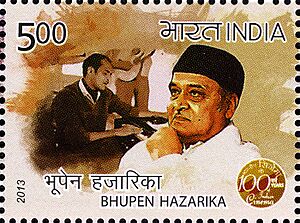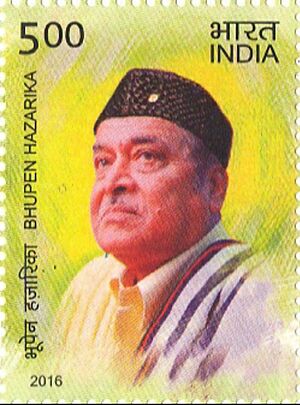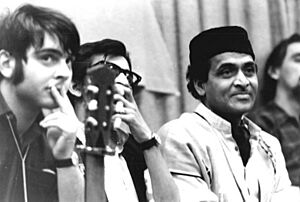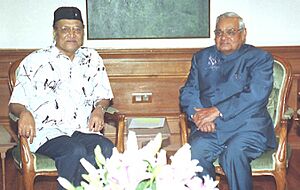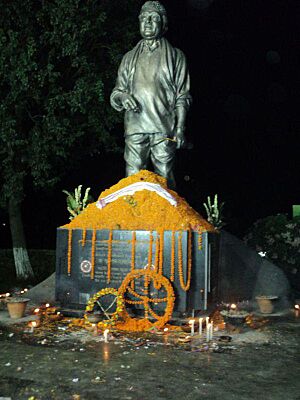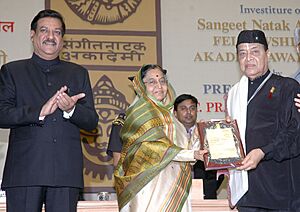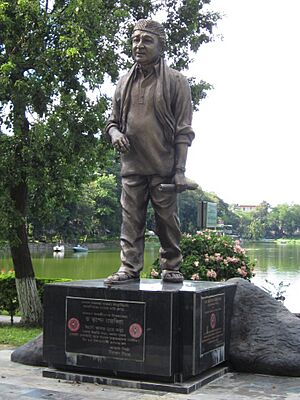Bhupen Hazarika facts for kids
Quick facts for kids
Bhupen Hazarika
|
|
|---|---|
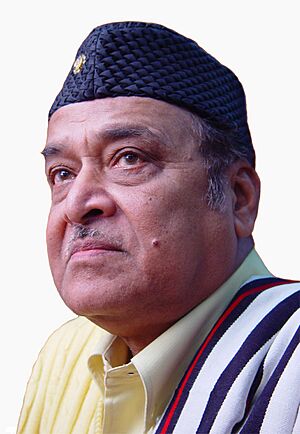
Hazarika in November 2011
|
|
| Born | 8 September 1926 Sadiya, Assam, British India
|
| Died | 5 November 2011 (aged 85) |
| Other names | Sudha Kontho |
| Education | Cotton College, Benaras Hindu University, Columbia University |
| Occupation | poet, lyricist, songwriter, composer, singer, music director, filmmaker, politician |
| Years active | 1939–2010 |
|
Notable work
|
Rudaali Darmiyaan: In Between Gaja Gamini Daman Indramalati |
| Political party | Bharatiya Janata Party (2004–2011) |
| Movement | Indian Peoples Theater Association |
| Spouse(s) | Priyamvada Patel |
| Children | 1 |
| Relatives | Sudakshina Sarma (sister) Jayanta Hazarika (brother) |
| Awards | Bharat Ratna (2019) (posthumously) Padma Vibhushan (2012) (posthumously) Padma Bhushan (2001) Padma Shri (1977) Dadasaheb Phalke Award (1992) Sangeet Natak Akademi Fellowship (2008) Asom Ratna (2009) Friends of Liberation War Honour (2011) |
| Member of Assam Legislative Assembly | |
| In office 1967–1972 |
|
| Preceded by | constituency established |
| Succeeded by | Lila Kanta Das |
| Constituency | Naoboicha |
| Signature | |
 |
|
Bhupen Hazarika (8 September 1926 – 5 November 2011) was a famous Indian singer, songwriter, and filmmaker from Assam. People often called him Sudha Kontho which means "nectar-throated" because of his beautiful voice. He wrote and sang most of his songs in the Assamese language. These songs often talked about humanity and people getting along. Many of his songs were translated into Bengali and Hindi.
His music was very popular in Assam, West Bengal, and Bangladesh. He helped bring the culture and folk music of Assam and Northeast India to a wider audience in India. Bhupen Hazarika received many top awards. These include the Dadasaheb Phalke Award (1992), which is India's highest award for cinema. He also received the Padma Shri (1977), Padma Bhushan (2001), and the Padma Vibhushan (2012). After he passed away, he was given India's highest civilian award, the Bharat Ratna, in 2019. He also led the Sangeet Natak Akademi from 1998 to 2003.
Contents
About Bhupen Hazarika
His Early Life and Musical Start
Bhupen Hazarika was born on 8 September 1926 in Sadiya, a town in Assam. His mother loved music and taught him many lullabies and traditional Assamese songs. He was the oldest of ten children. When he was young, his family moved a few times. In Tezpur, when he was just 10 years old, two famous Assamese artists, Jyotiprasad Agarwala and Bishnu Prasad Rabha, discovered his talent. He sang a traditional devotional song at a public event.
In 1936, he went to Kolkata and recorded his first song. At age 12, he sang two songs in Agarwala's film Indramalati (1939). Even as a teenager, he wrote songs that showed his strong spirit, like "Agnijugar firingathi mai" (I am the spark of the age of fire). This showed he was already becoming a talented lyricist, composer, and singer.
His Education and Career Journey
Hazarika finished high school in Tezpur in 1940. He then studied at Cotton College and Banaras Hindu University, earning his master's degree in Political Science in 1946. He briefly worked at All India Radio in Guwahati.
In 1949, he received a scholarship to study at Columbia University in New York. There, he earned his PhD in 1952. While in New York, he met Paul Robeson, a famous civil rights activist and singer. Robeson told him that a guitar is not just a musical instrument, but a "social instrument." This inspired Hazarika to use music to bring about social change. His famous song Bistirno Parore was influenced by Robeson's song Ol' Man River. This song is still very popular today.
In 1950, he married Priyamvada Patel in New York. Their son, Tez Hazarika, was born in 1952. Bhupen Hazarika returned to India in 1953.
Here are some of his famous songs in Assamese:
- Bistirno Parore (বিস্তীৰ্ণ পাৰৰে)
- Moi Eti Jajabor (মই এটি যাযাবৰ)
- Ganga Mor Maa (গংগা মোৰ মা)
- Bimurto Mur Nixati Jen (বিমূৰ্ত মোৰ নিশাটি যেন)
- Manuhe Manuhor Babey (মানুহে মানুহৰ বাবে)
- Snehe Aamar Xoto Shrabonor (স্নেহে আমাৰ শত শ্ৰাৱণৰ)
- Gupute Gupute Kimaan Khelim (গুপুতে গুপুতে কিমান খেলিম)
- Buku Hom Hom Kore (বুকু হম্ হম্ কৰে)
- Sagar sangamat (সাগৰ সংগমত)
- Shillongore Godhuli (শ্বিলঙৰে গধূলি)
Working with IPTA
After returning from the US in 1953, Hazarika joined the Indian People's Theatre Association (IPTA). This group used plays and music to spread social messages and bring people together. He became an important part of their activities in Assam.
His Professional Achievements
After his studies, Bhupen Hazarika briefly taught at Guwahati University. However, he soon moved to Kolkata to focus on music. He became a very successful music director and singer. He made several award-winning Assamese films, like Shakuntala and Pratidhwani. He also created timeless music for many Assamese films. He was known for bringing new styles to Bengali music as well. His music for films from Bangladesh also gained international recognition.
In 1993, he was elected President of the Asam Sahitya Sabha, a major literary organization. He also served as a member of the Assam Legislative Assembly from 1967 to 1972.
- Fighting for Fairness
From a young age, Bhupen Hazarika stood up against social unfairness. He believed in equality for everyone, no matter their background. He used his music and his life to challenge old ways of thinking and promote a more equal society.
Later Years and Passing Away
In the early 1970s, Bhupen Hazarika met filmmaker Kalpana Lajmi. She worked with him on many projects, including films like Ek Pal (1986), Rudaali (1993), and Daman: A Victim of Marital Violence (2001). Many of his older songs were re-recorded in Hindi for these films.
He also had a brief political career. He ran for a seat in the Indian Parliament in 2004 but did not win.
Bhupen Hazarika was admitted to a hospital in Mumbai on 30 June 2011. He passed away on 5 November 2011, due to organ failure. His funeral was held in Guwahati and was attended by a huge crowd of people who admired him.
His Legacy and Impact
Bhupen Hazarika was known for his deep voice and poetic songs. His lyrics often told stories and shared messages about love, society, and politics. He also used folk music in his compositions. In Bangladesh, his song "Manush Manusher Jonno" (Humans are for humanity) was chosen as one of the most favorite songs.
Many of his famous songs were inspired by American Black Spiritual songs. He learned these from Paul Robeson during his time in New York. For example, his song "Bistirno Parore" was greatly influenced by Robeson's "Ol' Man River."
A documentary film about his life, called Moi Eti Zazabor ('I am a Wanderer'), began production in 1986. It shows his public performances and private moments. The film is still being completed by one of its directors, Arnab Jan Deka.
Awards and Special Recognitions
National and State Awards
- Award for the Best Feature Film in Assamese (Shakuntala) in 1961.
- The Best Music Director National Award for "Chameli Memsaab" in 1975.
- Padma Shri – India's fourth-highest civilian award (1977).
- Gold medal from Arunachal Pradesh for his work with tribal culture (1979).
- Sangeet Natak Akademi Award (1987).
- Dadasaheb Phalke Award – India's highest award for cinema (1992).
- Padma Bhushan – India's third-highest civilian award (2001).
- Sangeet Natak Akademi Fellowship (2008).
- Asom Ratna – the highest civilian award in Assam (2009).
- Friends of Liberation War Honour from the Government of Bangladesh (2011).
- Padma Vibhushan – India's second-highest civilian award (2012, given after his death).
- Bharat Ratna
 – India's highest civilian award (2019, given after his death).
– India's highest civilian award (2019, given after his death).
Other Awards and Honors
- All India Critic Association Award for best folk artist (1979).
- Ritwik Ghatak Award for best music director for two plays (1979 and 1980).
- First Indian to win Best Music for the film Rudaali at the Asia Pacific International Film Festival in Japan (1993).
- Honorary Degree from Tezpur University (2001).
- Lifetime Achievement Award at the Kalakar Award (2002).
- A life-size statue of Hazarika was built in Guwahati in 2009.
- The Barshapara Cricket Stadium was renamed Dr. Bhupen Hazarika Cricket Stadium in 2010.
- He was honored with commemorative postage stamps by India Post in 2013 and 2016.
- India's longest road bridge, the Dhola-Sadiya bridge, is named after him.
- On 8 September 2022, Google honored Hazarika with a Google Doodle to celebrate his 96th birthday.
Films He Worked On
| Year | Film | Credited as | |||||
|---|---|---|---|---|---|---|---|
| Playback singer | Composer | Director | Producer | Writer | Actor | ||
| 1939 | Indramalati | Yes | |||||
| 1948 | Siraj | Yes | |||||
| 1955 | Pioli Phukan | Yes | |||||
| 1956 | Era Bator Sur | Yes | Yes | ||||
| 1958 | Mahut Bandhu Re | Yes | |||||
| 1961 | Shakuntala | Yes | Yes | Yes | |||
| 1964 | Pratidhwani | Yes | |||||
| 1964 | Ka Swariti | Yes | |||||
| 1966 | Lati-Ghati | Yes | |||||
| 1969 | Chik Mik Bijuli | Yes | Yes | Yes | |||
| 1974 | Aarop | Yes | |||||
| 1974 | For Whom the Sun Shines | Yes | |||||
| 1975 | Chameli Memsaab | Yes | Yes | ||||
| 1975 | Khoj | Yes | Yes | ||||
| 1976 | Roop Konwar Jyoti Parsad Aru Joymoti | Yes | |||||
| 1976 | Mera Dharam Meri Maa | Yes | Yes | ||||
| 1977 | Through Melody and Rhythm | Yes | |||||
| 1977 | Shimana Perye | Yes | |||||
| 1978 | Chameli Memsaheb (Bengali) | Yes | |||||
| 1979 | Mon-Prajapati | Yes | |||||
| 1979 | Debdas | Yes | |||||
| 1981 | Chameli Memsaab | Yes | |||||
| 1982 | Aparoopa | Yes | |||||
| 1986 | Swikarokti | Yes | |||||
| 1986 | Ek Pal | Yes | Yes | Yes | Yes | ||
| 1988 | Siraj | Yes | Yes | ||||
| 1993 | Rudaali | Yes | Yes | ||||
| 1993 | Pratimurti | Yes | |||||
| 1995 | Pani | Yes | Yes | ||||
| 1997 | Do Rahain | Yes | |||||
| 1997 | Darmiyaan: In Between | Yes | Yes | ||||
| 1998 | Saaz | Yes | |||||
| 2000 | Gaja Gamini | Yes | Yes | ||||
| 2001 | Daman: A Victim of Marital Violence | Yes | Yes | ||||
| 2003 | Kyon? | Yes | |||||
| 2006 | Chingaari | Yes | Yes | ||||
| 2011 | Gandhi to Hitler | Yes | |||||
Images for kids
See also
 In Spanish: Bhupen Hazarika para niños
In Spanish: Bhupen Hazarika para niños
 | Laphonza Butler |
 | Daisy Bates |
 | Elizabeth Piper Ensley |


